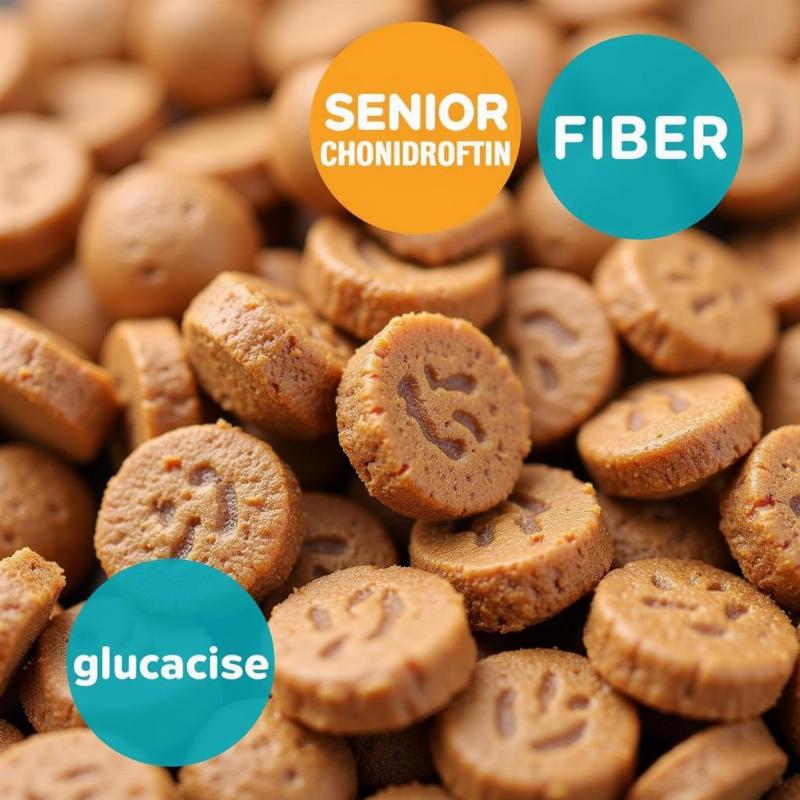Finding the right dog food for senior dogs struggling with dental issues can be a challenge. As dogs age, their teeth can become worn, decayed, or even missing, making chewing painful and affecting their ability to eat a nutritious diet. Choosing the best dog food for old dogs with bad teeth involves considering factors like texture, ingredients, and nutritional value to ensure your furry friend gets the nourishment they need.
Soft Dog Food Options for Senior Pups with Dental Problems
For older dogs with bad teeth, softer food options are often the best choice. These can range from canned wet food to specially formulated kibble that is easier to chew. Consider these options:
- Canned Wet Food: This is often the most palatable and easiest to eat for dogs with dental pain. Look for options that are specifically formulated for senior dogs, providing complete and balanced nutrition.
- Soaked Kibble: Dry kibble can be softened by adding warm water or broth. This can make it easier for older dogs to chew and swallow. Be sure to discard any uneaten soaked kibble after a short time to prevent bacterial growth.
- Soft Dry Kibble: Some brands offer kibble specifically designed for senior dogs with dental problems. These kibbles are smaller and have a softer texture than regular dry food.
Key Nutritional Considerations for Senior Dogs
As dogs age, their nutritional needs change. Senior dog food formulas often include:
- Glucosamine and Chondroitin: These supplements support joint health, which is especially important for older dogs.
- Antioxidants: These help protect against cell damage and boost the immune system.
- Fiber: This aids in digestion and can help prevent constipation, a common issue in older dogs.
- Controlled Calories: Senior dogs are often less active and require fewer calories to maintain a healthy weight.
 Senior dog food ingredients for joint health and digestion
Senior dog food ingredients for joint health and digestion
Making Mealtime Easier for Your Senior Dog
Beyond choosing the right food, there are other ways to make mealtime more comfortable for your senior dog:
- Elevated Food Bowls: These can reduce strain on the neck and back, making it easier for older dogs to eat.
- Small, Frequent Meals: Instead of two large meals, consider feeding your senior dog several smaller meals throughout the day.
- Dental Treats and Chews: While your dog has bad teeth, certain dental treats specifically designed for sensitive gums can help clean teeth and freshen breath. Consult with your vet for recommendations.
When to Consult Your Veterinarian
If your senior dog is experiencing significant difficulty eating or shows signs of dental pain, it’s crucial to consult your veterinarian. They can perform a thorough dental examination and recommend the best course of action, which may include a professional cleaning or extractions. food for dog with no teeth
Conclusion
Choosing the right dog food for old dogs with bad teeth can significantly improve their quality of life. By selecting a soft, palatable food rich in essential nutrients and making mealtime more comfortable, you can ensure your senior dog gets the nourishment they need to thrive. cheap dental cleaning for dogs Don’t hesitate to finger wipes for dogs teeth for daily cleaning.
FAQ
- What is the best type of food for a dog with no teeth? Soft wet food, purees, or specially formulated dental diets are best. [what do cats and dogs have in common](https://beautdogs.us/what-do-cats-and-dogs-have-in common/)
- Can I give my old dog baby food? While some baby foods are safe, always consult your vet first to ensure they meet your dog’s nutritional needs.
- How often should I brush my senior dog’s teeth? Ideally, daily brushing is best. However, if your dog has dental issues, consult your vet for guidance. chlorhexidine dental rinse for dogs may be an option.
- Are there any home remedies for dog bad breath? Certain fruits and vegetables can help freshen breath, but persistent bad breath can indicate dental problems, requiring a vet visit.
- How can I tell if my dog is experiencing dental pain? Signs include difficulty eating, drooling, pawing at the mouth, and changes in behavior.
- What are the benefits of dental chews for senior dogs? Some dental chews can help clean teeth and reduce plaque buildup, but choose ones appropriate for sensitive gums and consult your vet.
- How can I encourage my senior dog to eat if they have dental pain? Warming up their food, offering smaller, more frequent meals, and providing soft food options can help.
Beautdogs.us is your premier online destination for comprehensive and reliable information on dog care, breeds, and products specifically tailored to the needs of dog owners in the US. We offer expert advice and resources to help you navigate every aspect of dog ownership, whether you’re a seasoned pet parent or just starting your journey. From nutrition and grooming to training and health, Beautdogs.us is your trusted source. Connect with us today for personalized support: Email: [email protected], Phone: +1 501-555-7529.